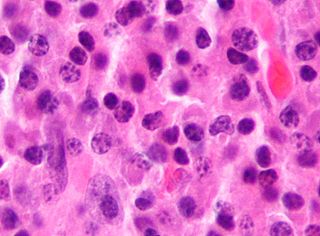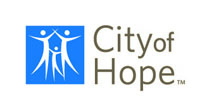Related Research Articles
Hematology is the branch of medicine concerned with the study of the cause, prognosis, treatment, and prevention of diseases related to blood. It involves treating diseases that affect the production of blood and its components, such as blood cells, hemoglobin, blood proteins, bone marrow, platelets, blood vessels, spleen, and the mechanism of coagulation. Such diseases might include hemophilia, sickle cell anemia, blood clots (thrombus), other bleeding disorders, and blood cancers such as leukemia, multiple myeloma, and lymphoma. The laboratory analysis of blood is frequently performed by a medical technologist or medical laboratory scientist.

Lymphoma is a group of blood and lymph tumors that develop from lymphocytes. The name typically refers to just the cancerous versions rather than all such tumours. Signs and symptoms may include enlarged lymph nodes, fever, drenching sweats, unintended weight loss, itching, and constantly feeling tired. The enlarged lymph nodes are usually painless. The sweats are most common at night.

Tumors of the hematopoietic and lymphoid tissues or tumours of the haematopoietic and lymphoid tissues are tumors that affect the blood, bone marrow, lymph, and lymphatic system. Because these tissues are all intimately connected through both the circulatory system and the immune system, a disease affecting one will often affect the others as well, making aplasia, myeloproliferation and lymphoproliferation closely related and often overlapping problems. While uncommon in solid tumors, chromosomal translocations are a common cause of these diseases. This commonly leads to a different approach in diagnosis and treatment of hematological malignancies. Hematological malignancies are malignant neoplasms ("cancer"), and they are generally treated by specialists in hematology and/or oncology. In some centers "hematology/oncology" is a single subspecialty of internal medicine while in others they are considered separate divisions. Not all hematological disorders are malignant ("cancerous"); these other blood conditions may also be managed by a hematologist.

The Leukemia & Lymphoma Society (LLS), a 501(c)(3) charitable organization founded in 1949, is a voluntary health organization dedicated to fighting blood cancer world-wide. The LLS mission is: Cure leukemia, lymphoma, Hodgkin's disease, and myeloma, and improve the quality of life of patients and their families. LLS funds blood cancer research around the world, provides free information and support services, and is a voice for all blood cancer patients seeking access to quality and affordable care.
The Canadian Cancer Society is Canada's largest national cancer charity and the largest national charitable funder of cancer research in Canada.
Dana–Farber Cancer Institute is a comprehensive cancer treatment and research institution in Boston, Massachusetts. Dana–Farber is the founding member of Dana–Farber/Harvard Cancer Center, Harvard's Comprehensive Cancer Center designated by the National Cancer Institute, and one of the 15 clinical affiliates and research institutes of Harvard Medical School.

Tipifarnib is a farnesyltransferase inhibitor. Farnesyltransferase inhibitors block the activity of the farnesyltransferase enzyme by inhibiting prenylation of the CAAX tail motif, which ultimately prevents Ras from binding to the membrane, rendering it inactive.

Blood Cancer UK, is a UK-based charity dedicated to funding research into all blood cancers including leukaemia, lymphoma and myeloma, as well as offering information and support to blood cancer patients.

City of Hope is a private, non-profit clinical research center, hospital and graduate school located in Duarte, California, United States. The center's main campus resides on 110 acres (45 ha) of land adjacent to the boundaries of Duarte and Irwindale, with a network of clinical practice locations throughout Southern California, satellite offices in Monrovia and Irwindale, and regional fundraising offices throughout the United States.
The Israel Cancer Research Fund (ICRF) is a fund for cancer research. The ICRF was founded in 1975 by a group of American and Canadian physicians, scientists, and lay people who sought to prevent the permanent loss of Israel's cancer researchers to foreign universities due to the lack of funding in Israel for newly minted Ph.D.s, post-doctoral fellows, and accomplished young scientists (a phenomenon known to many as Israel's "brain drain"). With chapters in New York, Los Angeles, Chicago, Toronto, Montreal and Jerusalem, ICRF annually sponsors a grant review process conducted by an expert panel of U.S. and Canadian scientists and oncologists, and modeled on the NIH grant-making process.

Bendamustine, sold under the brand name Treanda among others, is a chemotherapy medication used in the treatment of chronic lymphocytic leukemia (CLL), multiple myeloma, and non-Hodgkin's lymphoma. It is given by injection into a vein.

The Leukaemia Foundation is a national charity in Australia dedicated to helping people who have been diagnosed with leukaemia, lymphoma, myeloma, MDS, MPN, Waldenström's macroglobulinaemia, aplastic anaemia, or amyloidosis.
The International Cancer Genome Consortium (ICGC) is a voluntary scientific organization that provides a forum for collaboration among the world's leading cancer and genomic researchers. The ICGC was launched in 2008 to coordinate large-scale cancer genome studies in tumours from 50 cancer types and/or subtypes that are of main importance across the globe.
Milatuzumab is an anti-CD74 humanized monoclonal antibody for the treatment of multiple myeloma non-Hodgkin's lymphoma and chronic lymphocytic leukemia.

The Hematological Cancer Research Investment and Education Act of 2001 amends the Public Health Service Act to allocate funding and establish directed research and education programs targeted at forms of blood cancer, in particular leukemia, lymphoma, and multiple myeloma.
Charlene McMann is a philanthropist and convicted fraudster who was the co-founder and chief executive officer of the now-defunct Chicago Blood Cancer Foundation, a non-profit raising money for lymphoma, leukemia, and myeloma.

The London Bikeathon is London's largest annual charity cycling event with 5,000 riders taking part in 2012. The event first took place in 1997 and has been held every year since. The ride is the flagship fundraising event of the UK charity Leukaemia & Lymphoma Research who fund scientific research focused on finding causes and improving diagnosis and treatment for blood cancer patients.

The Binaytara Foundation (BTF) was established in 2007 by Dr. Binay Shah and wife Tara Shah with the goal of promoting health and education in underprivileged societies. The BTF is a Washington State nonprofit organization exempt from taxation pursuant to Section 501(c)(3) of the Internal Revenue Code. BTF has founded multiple programs in underdeveloped and developing countries to improve access to healthcare. Recent accomplishments include building a 25-bed cancer hospital in Nepal in 2018 and breaking ground on their new 200-bed facility in 2022.

Team In Training (TNT) is the flagship fundraising program for the Leukemia & Lymphoma Society (LLS), the world's largest voluntary health organization dedicated to funding blood cancer research, education and patient services. TNT is the only endurance sports training program where volunteers train to complete a marathon, half marathon, cycle event, triathlon or hike adventure, while fundraising to support the fight against blood cancers.
David G. Maloney is an oncologist and researcher at Fred Hutchinson Cancer Research Center and the University of Washington who specializes in developing targeted immunotherapies for the treatment of blood cancers.
References
- ↑ Canadian Cancer Society/National Cancer Institute of Canada: Canadian Cancer Statistics 2007
- ↑ News Release, June 30, 2004 LLS White Plains, New York